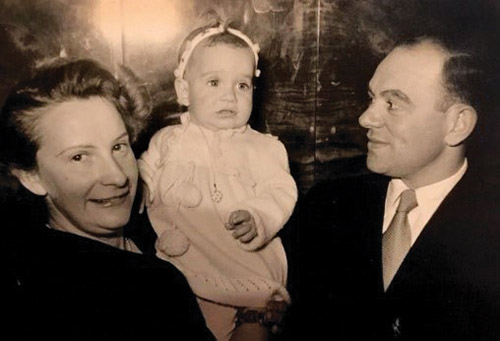


Several months ago, Helene Kamioner of Riverdale, received an unexpected email from Esther Gold, a relative living in Detroit, stating that Yad Vashem had contacted her about a prisoner identification tag that had been traced back to Helene’s father, Yechiel Kamioner. Gold had been tracing her ancestry on myheritage.com at the time that Evgeny Rozin, a genealogist at Yad Vashem’s artifacts division, was investigating a prisoner identification tag, trying to match the number on the pendant with other records at Yad Vashem. Records showed the tag had once belonged to Yechiel Kamioner; tags such as this one were used in the Hasag Pelcery in Czestochowa during the Holocaust. Could Gold supply additional information about Kamioner and the factory? Instead, Gold forwarded the email, together with pictures, to Helene.
Helene spoke to The Jewish Link about the surprise email and identification tag, saying she was “stunned and exhilarated at the same time, because of the activity surrounding this find. The realness of the Holocaust, the fact that it couldn’t be denied…this made it real, solidified the story.” Helene talked about the incredible work undertaken by Yad Vashem in promoting the reality of the Holocaust and providing proof to those who are intent on denial. She said the tag was a miraculous find; it made her feel like her father “was visiting me.”
While Yechiel had talked to his family about the Holocaust, he often romanticized the stories so as not to alarm his children. He spoke about eating “zup mit katchka” (soup with duck) and other “good” things. As a child, growing up on a chicken farm in Lakewood, New Jersey, Helene noted that her home was always filled with survivors. She listened to others’ agonizing stories about the multitudes of people killed or missing and the harrowing stories of survival. She attributed her father’s survival to the fact that he was clever, a likeable person and able to do hard work, as well as a gift from God.
Sara Shor, a collection manager at Yad Vashem’s artifacts collection division, provided interesting background about research into prisoner tags. The artifacts collection in Yad Vashem consists of some 35,000 artifacts, many of which have been donated by the survivors themselves or relatives of the victims. With the computerization of Yad Vashem’s databases and the advance of technology and digitization of assorted databases everywhere, “we are now in a position to synchronize between all the information available at Yad Vashem about a survivor or victim’s fate during the war as well as information available worldwide.” The museum is always seeking to add more information to what it already has.
While researching prisoner tags from various sources, Shor found that the number on the metal tag with a Star of David and the numbers “1283” belonged to Yechiel Kamioner, born April 25, 1920, in Wielun, Poland. Yechiel worked at forced labor camps in Czestochowa from 1939 to 1941 and was listed as a resident of the ghetto. It was recorded that he had worked at Hasag Pelcery Work Camp, a German weapons manufacturer, from September 1942 until 1945. Liberated in January 16, 1945, he remained in Czestochowa until January 1946, when he was listed in the DP Camp at Schlachtensee-Berlin until May 1946. Married in Munich, he and his wife, Chava, and their daughter, Helene, arrived in the United States in 1952. Their son, Henry, was born in 1955.
Yechiel’s tag came into the Yad Vashem collection in 1984, donated by Jan Rochwerger, who was associated with the Jewish Historical Institute in Warsaw for many years. Rochwerger, a researcher in Warsaw, passed along the tag together with another item that seems to be unrelated. Helene said that “maybe a Polish person was looking for treasure to sell, found it and sold it to the museum,” but the mystery remains and no one knows for sure how the find was made.
Helene recalled the difficult times her family had during the war. Her mother had seven sisters, all of whom were killed, and her father had nine sisters and brothers, all killed in the Chelmno gas vans (mobile gas chambers). Her father and a niece, Krysha, were the only ones to survive, after he found work for Krysha in the ghetto’s soup kitchens while he was working for Hasag. Helene often thinks about the terrible conditions in the Hasag Pelcery, where workers suffered from severe malnutrition, lice and typhus. Although Yechiel survived six years under German occupation, shortly after the Soviet army liberated the camp he became ill with typhus. Krysha nursed him back to health.
Helene reflected on the Holocaust and her upbringing, first in New Jersey and then in Riverdale. Although she would like to go to Yad Vashem to see her father’s identification tag, her age and health do not permit the trip. Growing up in a home with Holocaust survivors and hearing stories about the war have all affected Helene, who said she remains haunted by the stories she was told. Her father was “not a bitter man. To me he was a tzaddik.” His prisoner identification tag is “part of Jewish history. It’s part of my history.”
By Yvette Finkelstein










